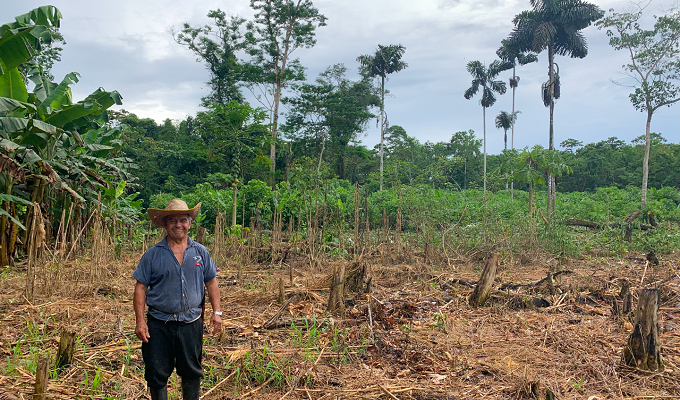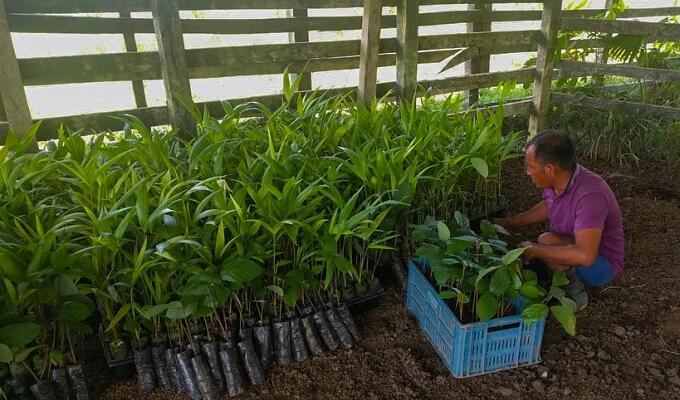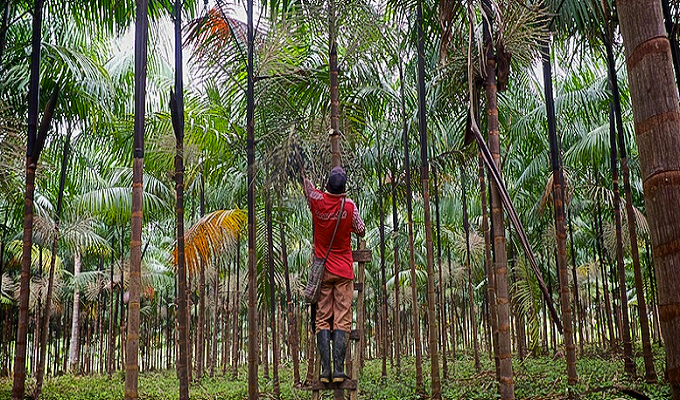


Farm sustainably, build peace
Sustainable farming in remote, conflict-ridden Putumayo in Colombia can save lives and fight violence – now more than ever
Edgar Montenegro is worried about the farmers he works with in the remote region of Putumayo: getting to this part of Colombia, which borders Peru and Ecuador and is 500 km from Bogotá, is already a hike on normal days. Now with COVID-19 and the country’s lockdown over the past few months, the region is barely accessible. Villagers are putting up barricades because they are scared. With no hospitals around, they do not wish to risk infection.
Fear and a lack of economic opportunities have led to a return to illegal activities and violence in this already troubled region.
‘The lockdown costs access to everything – you are stuck with produce that no one can come pick up and bring to town. So the farmers don’t earn any money and some return to illegal coca production’, says Mariana Cobo, project manager at Corpocampo NGO. ‘Putumayo is an area left behind as we say here. It is time-consuming and expensive to get there. You need permits. It is a complicated situation and people are tired.’
Mariana works for family-owned natural food company Corpocampo that specializes in the production and distribution of açai berries and palm hearts, with all products deriving from sustainable farming practices from over 500 hectares of critical rainforest in the Colombian Amazon. The goal of company founder Edgar Montenegro is to improve peoples’ lives by providing a legal and reliable source of income. He therefore only employs vulnerable Afro-Colombian and indigenous communities in areas affected by violence and poverty.
The Colombian Amazon region has long been affected by the country’s internal conflict, leading to widespread poverty, violence, and illegal coca crop production. Operating in several locations in Colombia, including Cauca, Nariño, Valle del Cauca and Putumayo escarpments, Corpocampo has so far provided jobs for over 240 women-headed households, impacting over 1,300 families.
After winning the 2018 Oslo Business for Peace Award and joining the UN Development Programme’s Business Call to Action, Corpocampo created a non-governmental sub-unit, sponsored by international donors: Corpocampo NGO.
As part of its social commitment, Corpocampo has pledged to integrate 600 new families into its açaí palm value chain by the end of 2020, providing smallholder suppliers and local plant employees with sustainable livelihoods through the production of its wild-harvested natural products. The teaming of the NGO with the company seemed an ideal solution to connect farmers to markets.
Açai is a native species of the Amazon region. Corpocampo plants organic crops deriving from palm trees not as mono crops but in agroforestry systems with Amazonian products. By establishing agroforestry systems with native species, Corpocampo contributes to the reforestation of the Amazon forest.
Mission impossible?
The consequences of the COVID-19 pandemic have turned what was already
a time-consuming and work-intense harvest production into what is almost ‘mission impossible’. Lockdown in Colombia is still ongoing.
Açai and palm hearts, Corpocampo’s two staple products, only grow in the Amazon and Pacific regions, making them hard to find. The COVID-19 pandemic has made finding raw material very difficult because Corpocampo has been unable to cross the border to Ecuador, the biggest palm heart provider.
‘Moreover, with the lockdown, we are not able to operate trucks. Every product we have is perishable and lasts only eight hours after picking it – you need to move fast to get the produce to the production plant’, explains Mariana.
A month ago, CorpoCampo NGO started providing some technical assistance again and buying everything available for export.
But the wild collection of açai is over, the berries will only be ready for harvest in 10 months.
‘We establish long-term relationships with the farmers for ten years because the first four years the crop is most vulnerable and the farmers will not receive much income from that. Once açai grows, the plant will give produce for over 30 years. To overcome this critical time we give the farmers cash crops, such as cassava and papaya that they can sell on local markets – but this is badly paid.’
With COVID-19, some farmers who only signed up recently, started leaving the project. As they have not received any income yet, they opted out. Moreover, with no internet or mobile service, Corpocampo was unable to connect with the farmers and their plant nurseries.
Fortunately, now that they are able to move more freely they have found an interim solution.
‘We now work through community leaders. We ensure that through them we can get through to everyone. We are creating videos for technical assistance to show how to take care of the crops while we cannot go. We want farmers to be productive – as an alternative to illegal crops or earning nothing. With açai we look for long-term solutions that are sustainable’, says Mariana.



